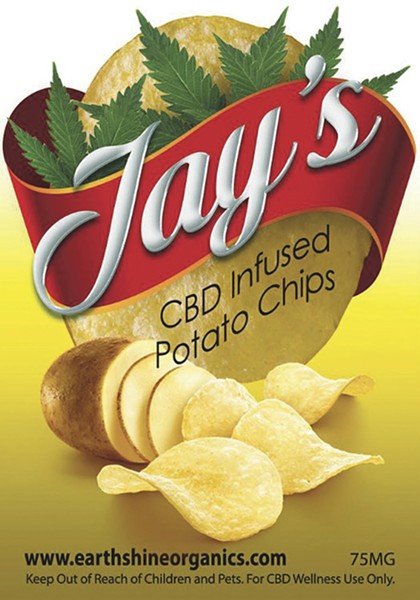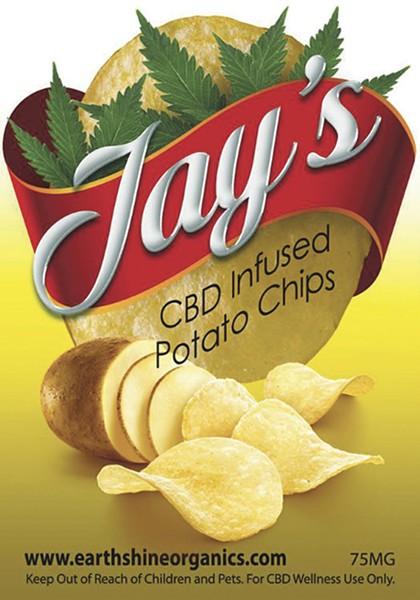Learn about brain health and nootropics to boost brain function
On the Stunt-Marketing of CBD


About 20 years ago, in the aisles of the El Cerrito Natural Grocery store, I confronted the full depth of how shameless some peddlers of health elixirs can be. I turned a corner, my basket full of fresh fruits and veggies and maybe an Amy's pizza, and was confronted by a display table loaded with a new brand of potato chips. On the packages was emblazoned the label, "Contains Gingko Biloba."
Leaving aside the perverseness of marketing a purported memory aid by adding it to a product loaded with brain sludge in the form of salt, sugar, and fat, the product left me wondering what the point was. If people wanted to try to improve their memory with an herbal extract, why would they need, or want, to ingest it by munching potato chips? The extract itself — pure, unadulterated, standardized — was readily available.
Then I realized: gingko (then very popular) was seen as "healthy," and people were buying the chips in a "natural foods" store. That made it easier for many of them to rationalize taking home a greasy sack of carbo-crisps. (Note: El Cerrito Natural Grocery was and is a fine store. But all such stores have to play this game, sadly).
The same kind of thing is happening now with CBD: cannabidiol, a component of the cannabis plant that doesn't get you high, but affords at least some, and possibly many, health benefits (it's shown to be effective for certain kinds of seizures, and there is fairly solid evidence that it can relieve chronic pain, anxiety, sleeplessness, and other maladies).
Name a food or beverage category, and someone, somewhere, is selling a "CBD" version of it. It's in soda pop, cake mix, breakfast cereals, and even hamburgers.
And, yes, it's in potato chips. An outfit called Earthshine Organics sells Jay's CBD Potato Chips. "These delicious treats," Earthshine boasts on its Web site, "are very salty and relaxing." That seems like a weird dual goal, but OK. The company promises that the "long-lasting CBD Chips are an exccellent [sic] to keep [sic] a consistent ingestion of CBD throughout the day." We have to assume that "long-lasting" refers to the CBD, and not to the chips, but then, "consistent ingestion" casts some doubt on that interpretation.
In any case, there is no explanation on the site — where you can also buy (wink, wink) Capt. Crunchy breakfast cereal — of why one would need their CBD to come in the form of an additive to potato chips or other wacky products. The packages carry the odd disclaimer, "For CBD Wellness Use Only." Does that mean you shouldn't enjoy the flavor, or the wackiness? It's hard to know. But the unspoken theory here is that the idea of "wellness" will make people think of the chips as a kind of health food.
Now, it's true that pot edibles are very popular. One legitimate reason is that a lot of people don't like to, or can't, smoke weed. Another is that the high is often different, and the dosing can be easier to control. And there might be good reasons someone doesn't want to ingest CBD oil straight — the taste, for instance. But there are plenty of sane options for those people, such as gummies and teas. The only reason CBD is added to potato chips, hamburgers, or breakfast cereal is that it serves as an easy marketing gimmick.
Which, ok. There are a lot of idiotic marketing gimmicks, for a lot of products; that's American capitalism! But the more serious quarters of the CBD industry are trying to get a real product with real benefits to be taken seriously by medical professionals, consumers, and politicians. They are not helped by the marketing of CBD-laced hair gel (yes, that's real, too). Goofy marketing is a problem for the recreational cannabis market, too, but at least that's ... recreation, not personal care.
Sadly, outright fraud is rampant in the CBD industry. As I reported in the Express' 4/20 issue, there are even CBD products out there that don't contain any CBD, but might contain nasty, dangerous chemicals and byproducts.
Even "legit" CBD is being marketed by shameless hucksters who are jumping on a bandwagon, just as has happened with gingko, St. Johns Wort, or, more recently, "keto" supplements. There's no way for the average consumer to know what might be in a CBD product bought at a Chevron station or even at CVS, because there are (so far) no standards for labeling such products. The only safe option for CBD, say rational observers, is to buy CBD only from licensed cannabis shops. There, at least you know that, by law, the products have been tested and contain what the labels say they contain. And if you want a bag of chips, just pick them up at the Chevron station, and leave the CBD on the shelf.
Anonymous and pseudonymous comments will be removed.
Click here to view full article